
The impact of addiction on cognitive functioning and recovery strategies
Understanding Addiction's Cognitive Toll
Addiction is not merely a physiological condition but a complex interplay of neurological and cognitive disorders. The effects of addiction extend deep into the brain, disrupting cognitive functions essential for daily life, such as memory, attention, and decision-making. By understanding how addiction diminishes cognitive functioning, we can better address recovery strategies necessary for those affected by substance use disorders.
The Cognitive Repercussions of Addiction
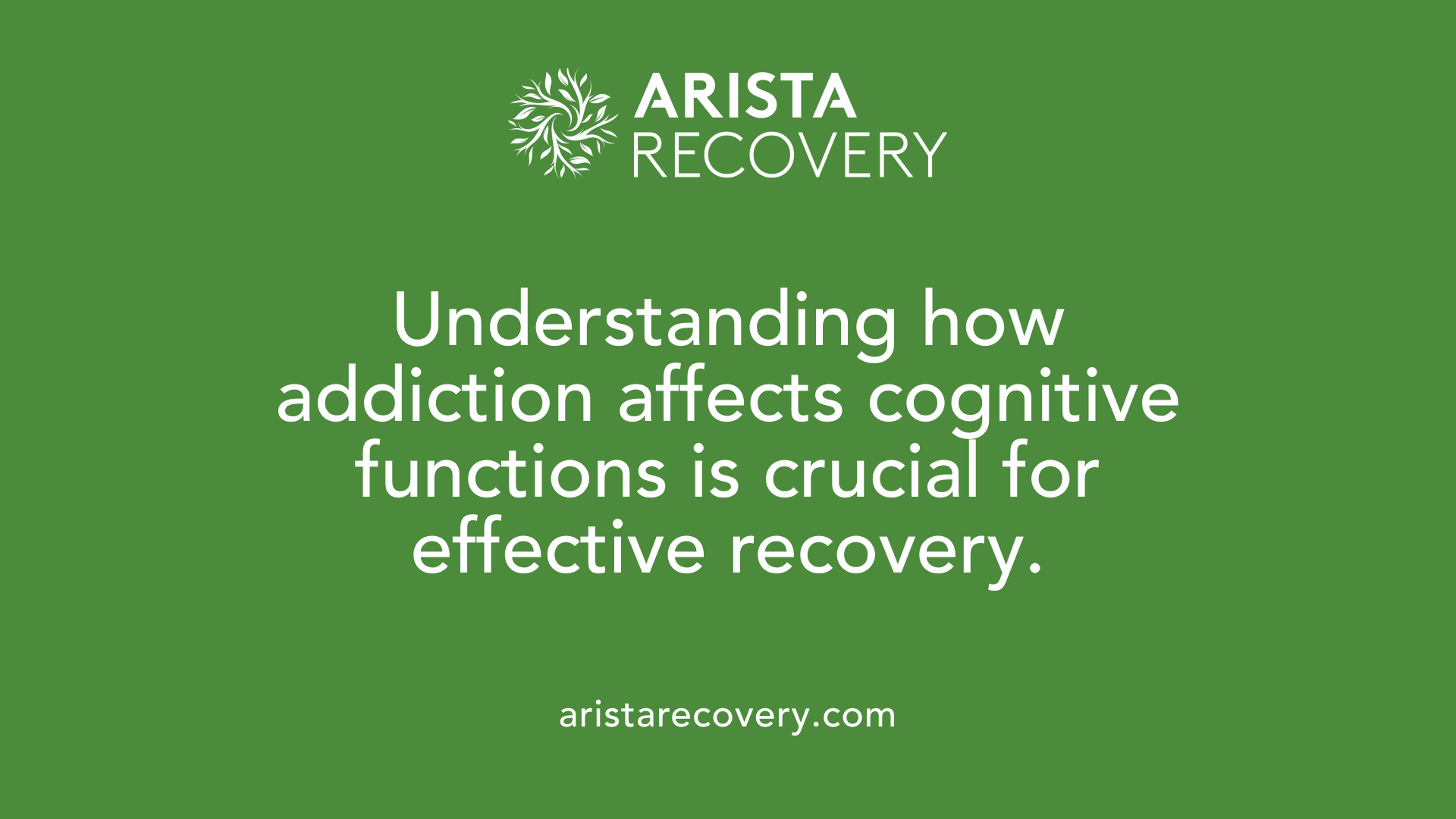
How does addiction affect cognitive function?
Addiction to psychostimulants such as cocaine, methamphetamine, and nicotine profoundly alters cognitive processes, resulting in significant deficits. These deficits include:
- Memory Impairments: Individuals often have difficulties with memory encoding and retrieval, leading to lapses that can hinder daily activities.
- Attention Issues: Chronic substance use can diminish the ability to focus, complicating treatment adherence and increasing relapse risks.
- Poor Decision-Making: Addicts frequently struggle with making sound choices due to impulsivity and cognitive distortions caused by altered brain functionality.
Compounding these challenges is the impact on executive functions, which are crucial for planning and problem-solving. This degradation complicates the recovery process as individuals often lack the necessary cognitive tools to navigate treatment effectively.
The Influence of Emotional Regulation and Behavioral Control
Beyond cognitive deficits, addiction significantly affects emotional regulation and behavioral control. The brain's reward system becomes maladaptive, heightening dependence on substances while diminishing the ability to engage in healthy behaviors. This imbalance can lead to:
- Emotional Dysregulation: Increased anxiety, depression, and mood swings exacerbate the struggle to maintain sobriety.
- Impaired Behavioral Control: Difficulty in managing urges and cravings significantly raises the risk of relapse during the recovery phase.
Effective treatment strategies must address these cognitive and emotional facets to enhance prospects for recovery. Research advocates for a combination of pharmacological options targeting brain systems like dopamine and non-pharmacological interventions such as cognitive-behavioral therapies and lifestyle adaptations. Addressing cognitive impairments is essential in promoting successful substance use disorder treatments and reintegration into society.
Cognitive Mechanisms Underlying Addiction
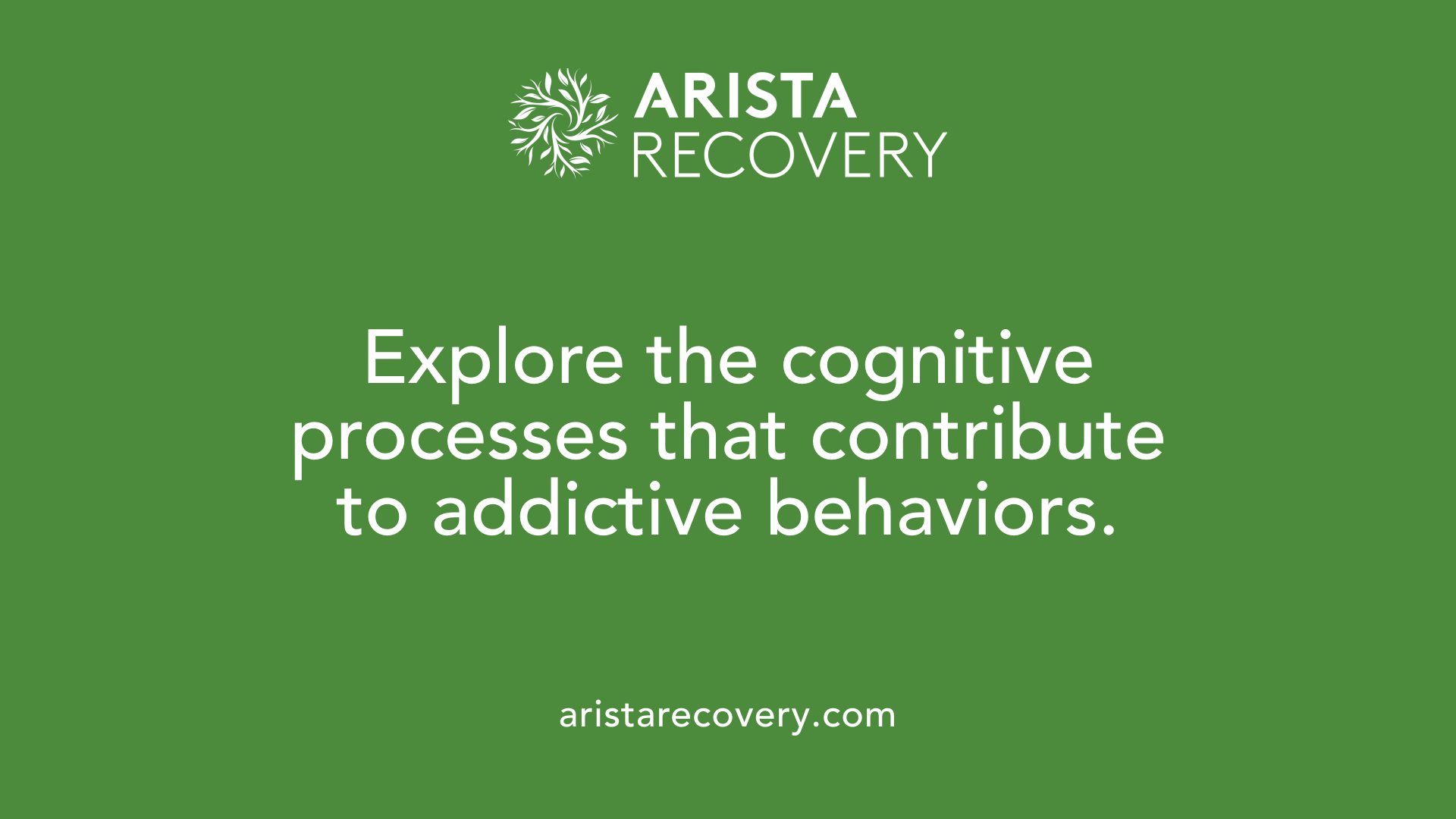
What is the cognitive approach to addiction?
The cognitive approach to addiction focuses on the mental processes that influence substance use behaviors. It identifies two primary cognitive processes: automatic and controlled. Automatic processes involve instinctive reactions and learned associations, which can lead to impulsive decisions, while controlled processes engage more rational thinking and self-awareness.
Strengthening of addictive behaviors through automatic processes
Addictive behaviors often become reinforced through automatic cognitive processes. These intuitive responses are driven by cravings and conditioned associations that develop during prolonged substance use. Consequently, the recognition of triggers can diminish as these automatic processes overshadow controlled thinking, reducing self-awareness regarding substance use.
Potential therapeutic strategies targeting cognitive mechanisms
Efforts to combat addiction through cognitive rehabilitation are increasingly vital. Therapies such as cognitive-behavioral therapy (CBT) and mindfulness practices aim to strengthen controlled cognitive processes by enhancing decision-making and emotional regulation. These approaches offer promising outcomes by disrupting automatic responses and encouraging healthier behaviors. Additionally, cognitive retraining exercises can boost cognitive functions like memory and attention, further aiding in recovery.
Navigating Recovery: The Cognitive Benefits of Sobriety
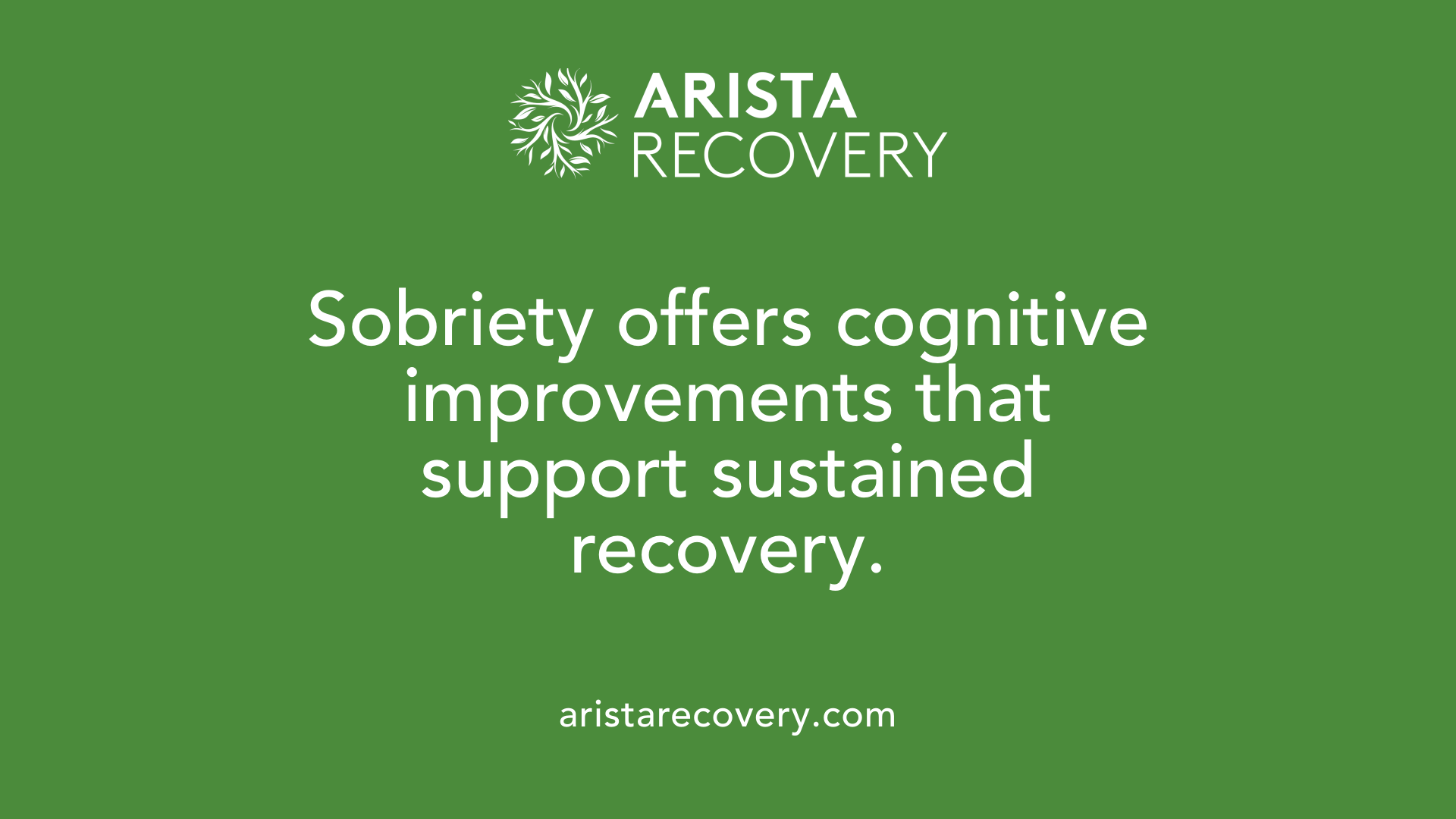
What are the cognitive benefits of sobriety?
Sobriety comes with significant cognitive improvements, particularly after an extended period without alcohol or drugs. Research indicates that the brain can recover in volume and functionality, with noticeable benefits in areas like memory and decision-making. Restoring brain regions previously impacted by substance use leads to enhanced motor skills and better emotional regulation.
In the recovery phase, many individuals report reduced impulsivity, which is crucial for making sound decisions and avoiding relapse. Improved cognitive functions can aid in re-engaging with daily activities and social interactions without the influence of substances.
Moreover, long-term sobriety fosters positive changes in brain circuitry that help reverse some of the cognitive deficits caused by heavy drinking or drug use. This is particularly vital as it enhances motivation and the ability to manage cravings, thus supporting sustained recovery.
Restoration of brain regions affected by substances
When individuals maintain sobriety, research shows that significant brain regions, especially those related to learning and memory, can gradually restore their structure. For instance, areas like the hippocampus may recover, leading to improved cognitive functions over time. This neuroplasticity demonstrates the brain's ability to adapt and heal, reinforcing the importance of prolonged abstinence in recovery.
Support resources for maintaining sobriety
Access to support services can significantly bolster cognitive recovery and overall mental health. Resources such as SAMHSA’s National Helpline can connect individuals with treatment options, including cognitive-behavioral therapy and other therapeutic interventions aimed at improving cognitive function. Integrating these support systems into recovery routines can not only assist in maintaining sobriety but also enhance cognitive stability in the long run.
Cognitive Influences on the Relapse Process
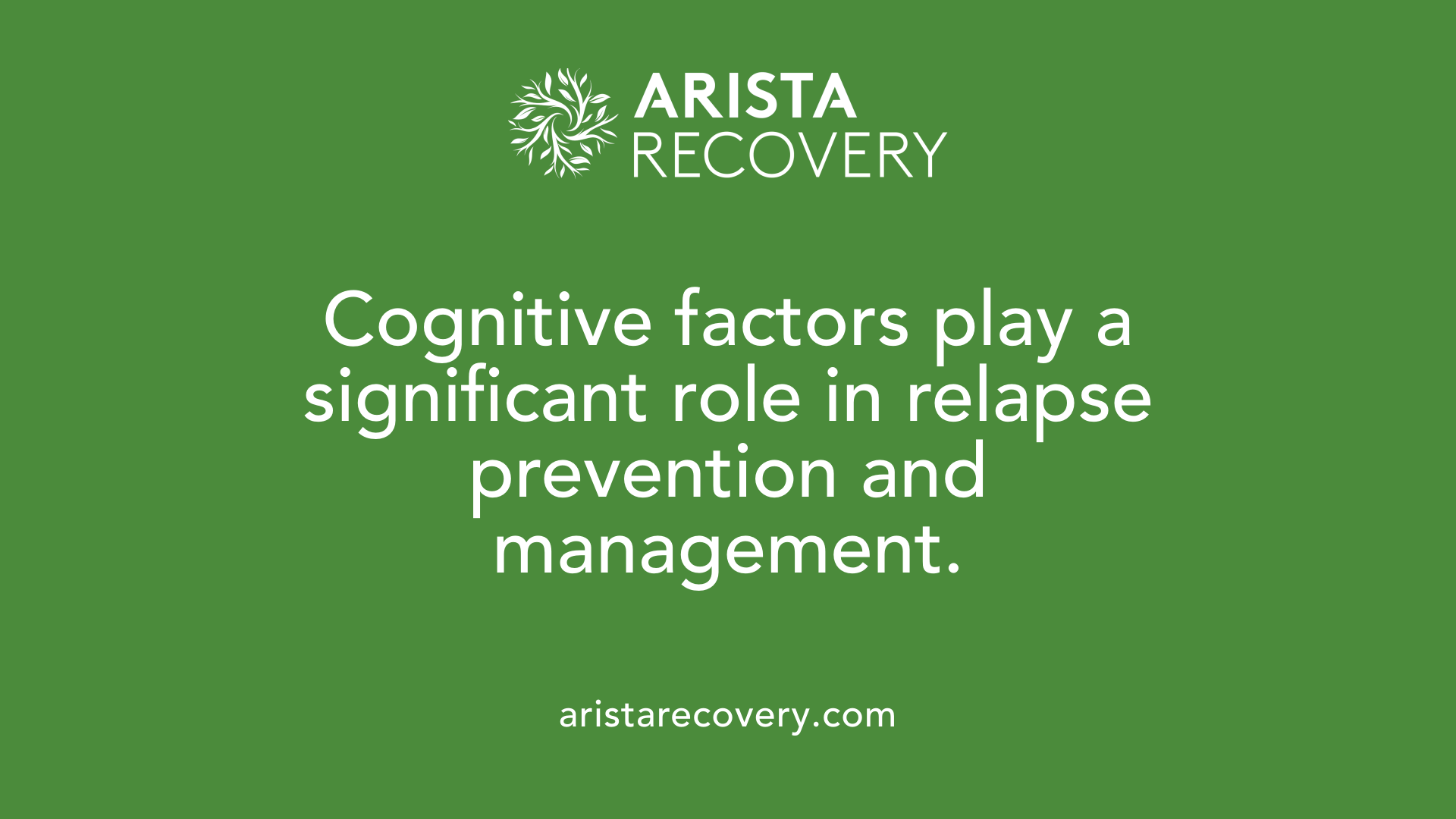
What are the cognitive factors involved in the relapse process?
The cognitive factors involved in the relapse process are multifaceted, with immediate determinants outlined in the Relapse Prevention (RP) model by Marlatt and Gordon. These include high-risk situations and the individual’s coping skills, which directly affect the likelihood of relapse.
Covert antecedents, such as lifestyle factors (e.g., lack of support or exposure to drug-related environments), stress levels, and cognitive distortions (including rationalization and denial), play a significant role in creating a predisposition to relapse. This cognitive distortion can lead individuals to underestimate their vulnerabilities.
Furthermore, urges and cravings, driven by both internal and external cues, can trigger a relapse. Therefore, enhancing self-efficacy and coping mechanisms is essential for managing these triggers effectively. Studies reveal that individuals capable of developing strong coping strategies for these high-risk situations are more likely to sustain their recovery.
Role of stress and lifestyle factors
Stress is a well-documented contributor to relapse in substance use disorders. High-stress environments can overwhelm individuals, leading them to resort to substance use as a maladaptive coping mechanism. This underscores the need for effective stress management strategies in recovery. Likewise, lifestyle factors—such as social support, engagement in healthy activities, and a balanced diet—play significant roles in maintaining sobriety.
Coping strategies for relapse prevention
Coping strategies for relapse prevention are critical components of recovery programs. Techniques derived from cognitive behavior therapy (CBT) can enhance an individual’s understanding of their cognitive processes, empowering them to navigate challenges effectively.
Table: Key Aspects of Coping Strategies for Relapse Prevention
| Strategy | Description | Benefits |
|---|---|---|
| Cognitive Behavioral Therapy (CBT) | Helps individuals identify and change negative thought patterns. | Enhances coping skills and self-efficacy. |
| Mindfulness Training | Teaches awareness of thoughts and feelings without judgment. | Reduces cravings and increases emotional regulation. |
| Stress Management Techniques | Includes relaxation exercises and time management skills. | Lowers stress levels, making coping easier. |
| Support Groups | Provides social support and shared experiences. | Reduces feelings of isolation and promotes accountability. |
Engaging in these strategies not only helps individuals understand their cognitive influences but also promotes a proactive approach to prevent relapse.
Substance-Induced Cognitive Impairment: Factors and Effects
Long-term cognitive decline due to substance use
Chronic drug abuse significantly disrupts brain structure and function, leading to persistent cognitive deficits. Research indicates that heavy and prolonged substance use can result in impairments across various cognitive domains, such as attention, memory, and decision-making. These deficits complicate recovery efforts since they hinder an individual’s ability to learn new behaviors required for sustained abstinence.
Prenatal and adolescent susceptibility
Vulnerability to cognitive impairment is heightened during critical developmental periods. Prenatal exposure to substances like alcohol and drugs can have lasting negative consequences on brain development. Similarly, adolescents, whose brains are still developing, are particularly susceptible to cognitive disruptions caused by drug use. Such effects can hinder their ability to engage effectively in treatment and recovery.
Neurological changes and their impact
Addiction leads to profound neurobiological alterations, including changes in neurotransmitter function and neural pathways. These changes directly impair cognitive functions critical for addiction recovery, such as impulse control and memory. For instance, chronic substance use can decrease synaptic plasticity and inhibit neurogenesis, limiting the brain’s adaptability and recovery potential. Addressing these cognitive deficits is crucial for effective treatment interventions, underscoring the importance of cognitive rehabilitation strategies alongside traditional approaches.
Neurobiological Foundation: Substances and the Brain
Alterations in brain structure and function
Chronic drug use leads to significant changes in brain structure, particularly affecting areas responsible for cognition, such as the prefrontal cortex and the hippocampus. These alterations can impair decision-making, attention, and memory retrieval, making recovery from addiction more challenging. Moreover, reductions in hippocampal volume are linked to diminished memory consolidation and significant cognitive deficits over time.
Dopamine and other neurotransmitter pathways
Substance abuse disrupts the normal balance of neurotransmitters, including dopamine and glutamate. This disruption not only leads to cravings and increased tolerance but also affects essential cognitive processes necessary for daily functioning, such as attention and problem-solving abilities. Over time, this hijacking of the brain's reward system can diminish the individual's ability to engage in healthy activities, further entrenching drug dependence.
Neurogenesis and its inhibition by substance use
Research indicates that addiction can inhibit neurogenesis, the formation of new neurons in the hippocampus, which is crucial for maintaining cognitive flexibility and memory. The impairment of neurogenesis contributes to the persistence of cognitive deficits, complicating efforts aimed at recovery. Therefore, promoting neuroplasticity through therapies and lifestyle changes may play a significant role in supporting cognitive recovery post-addiction.
Rehabilitation Approaches for Cognitive Recovery
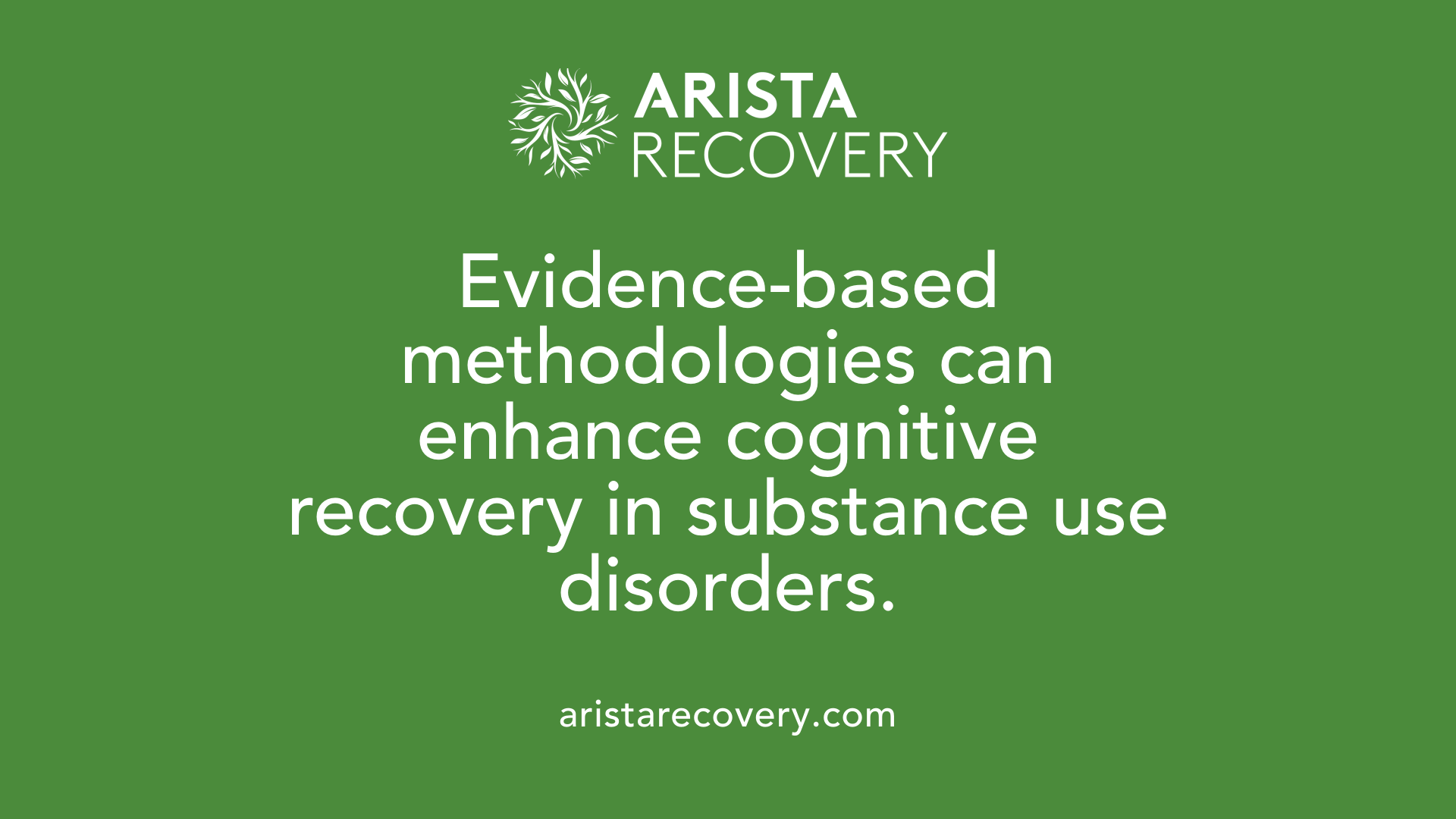
Evidence-based methodologies
Rehabilitation strategies for cognitive recovery in substance use disorders (SUD) lean heavily on evidence-based methodologies. Research has established that cognitive rehabilitation can offer tailored interventions designed to address specific cognitive deficits caused by addiction. Cognitive deficits, often marked by impairments in attention, memory, and decision-making, complicate recovery. Addressing these impairments is vital to enhance treatment outcomes and minimize relapse rates.
Combination of pharmacological and non-pharmacological strategies
An effective approach combines pharmacological agents—such as medications to restore neurotransmitter balance—with non-pharmacological strategies, including cognitive-behavioral therapy (CBT) and lifestyle modifications, aimed at improving cognitive functioning. For example, CBT can help individuals develop coping strategies to manage cravings and emotional disturbances arising from withdrawal, while regular exercise has been shown to enhance neuroplasticity and support brain recovery.
Cognitive-behavioral therapy and cognitive remediation
Cognitive-behavioral therapy plays a crucial role in helping patients improve their problem-solving and decision-making abilities. Likewise, cognitive remediation therapy focuses specifically on enhancing cognitive functions like working memory and inhibitory control. Integrating strategies like goal management training can further bolster executive functioning, which is often impaired in individuals with SUD. Together, these treatments lay a foundation for more effective and lasting recovery.
Influence of Cognitive Deficits on Treatment Outcomes
Impact of Executive Function Deficits
Cognitive impairments are highly prevalent among individuals suffering from substance use disorders (SUD), particularly affecting executive functions like attention, decision-making, and impulse control. Deficits in these areas are associated with poorer treatment outcomes, complicating recovery efforts. Studies have shown that individuals with impaired executive functions struggle more with adherence to treatment protocols, exacerbating their vulnerability to relapse.
Role in Treatment Adherence and Relapse
The interplay between cognitive function and treatment adherence is significant. Research indicates that better cognitive functioning correlates with a higher likelihood of following treatment protocols. Conversely, cognitive dysfunction can impair self-regulation, leading to increased relapse rates as individuals may have difficulty managing cravings and resist drug-seeking behaviors.
Cognitive Retraining and Rehabilitation Strategies
Cognitive retraining initiatives, such as cognitive-behavioral therapy (CBT) and other cognitive rehabilitation strategies, have shown promise in addressing cognitive deficits. Interventions designed to improve decision-making and problem-solving skills can enhance treatment engagement and overall recovery potential. For instance, strategies like Goal Management Training (GMT) help improve executive functioning, making it easier for individuals to cope with challenges during and after treatment.
Intervention Strategies: Cognitive Training and Rehabilitation
Cognitive training programs and their effectiveness
Cognitive training (CT) is emerging as a potential therapeutic approach for addressing cognitive impairments associated with substance use disorders (SUD). These programs aim to improve cognitive functions such as attention, memory, and executive functioning. Research has shown that effective CT can potentially enhance treatment engagement and reduce substance consumption. Cognitive therapies like motivational enhancement therapy and cue exposure therapy have been noted for their role in decreasing relapse rates by targeting emotional responses to drug-related cues.
Role of environmental enrichment and neuroplasticity
Environmental enrichment is another critical aspect of cognitive rehabilitation. Studies on rodents have demonstrated that enriched environments can modulate drug-seeking behavior and promote neuroplasticity. This suggests that, in humans, incorporating supportive and stimulating environments may aid cognitive recovery as well. Activities that stimulate the brain, such as physical exercise, can enhance neurogenesis and improve cognitive flexibility, boosting overall treatment effectiveness.
Potential benefits in reducing addiction symptoms
Addressing cognitive dysfunction through tailored cognitive training can lead to better treatment outcomes, particularly in self-control and decision-making. For instance, participants involved in cognitive strategy training demonstrated improvements in response inhibition compared to control groups. As individuals enhance their cognitive functions during recovery, they become increasingly proficient in managing cravings and implementing effective coping strategies, ultimately aiding in achieving and maintaining sobriety.
Addressing Mental Health and Cognitive Disruptions
Connection between mental health and addiction
The relationship between mental health disorders and addiction is complex and intertwined. Studies indicate that untreated mental illnesses can increase the risk of substance abuse, while substance use can further exacerbate mental health issues such as depression, anxiety, and psychosis. This reciprocal relationship highlights the necessity of understanding psychological components in treating substance use disorders (SUDs).
Psychological consequences and their cognitive impacts
Addiction significantly affects cognitive functions, impairing memory, attention, and decision-making abilities. These cognitive deficits can complicate recovery efforts by hindering motivation and the ability to cope with triggers. Furthermore, individuals often struggle with impulsivity and impaired judgment, increasing the likelihood of relapse, particularly during periods of emotional distress.
Integrated therapies supporting mental and cognitive recovery
To address both mental health and cognitive disruptions, various therapeutic strategies are implemented. Integrated approaches, such as cognitive-behavioral therapy (CBT) and mindfulness-based therapies, enhance emotional regulation and improve decision-making capacities. Additionally, cognitive training exercises, involving memory games and brain teasers, can help in restoring cognitive functions essential for sustained recovery. Regular physical activity, along with a balanced diet rich in omega-3 fatty acids, also supports cognitive and emotional well-being during the recovery process.
Paving a Path to Recovery
As we deepen our understanding of addiction's impacts on cognitive function, the importance of tailored and comprehensive recovery strategies becomes ever clearer. By integrating cognitive rehabilitation with traditional therapies and exploring novel interventions, we can better support affected individuals on their journey to recovery. Enhancing cognitive functions not only facilitates abstinence but also empowers individuals to rebuild their lives with resilience and hope. Addressing both mental health and cognitive disruptions will pave the way for more effective addiction treatment and improved quality of life.
References
- Addiction and Cognition - PMC
- Mental Health Impact of Drug Addiction on Cognition | RAC
- The Brain in Recovery
- Cognitive Impairment in Substance Use Disorders - PMC
- Brain and Cognition for Addiction Medicine: From Prevention to ...
- [PDF] Chronic Substance Use and Cognitive Effects on the Brain
- Neuroplastic and cognitive impairment in substance use disorders
- The Impact of Drug Abuse on Cognitive Function and Memory
When mental health challenges and addiction intersect, it can feel isolating. At Arista, we offer compassionate, evidence-based, and trauma-informed care to help you heal, grow, and move forward.
You’re not alone in this.
When mental health challenges and addiction intersect, it can feel isolating. At Arista, we offer compassionate, evidence-based, and trauma-informed care to help you heal, grow, and move forward.
Support that moves with you.
You’ve taken a brave first step. At Arista Recovery, we’re here to help you continue with best-in-class care designed for long-term healing and support.
.webp)






